英语人教版八年级下册初中英语语法动词时态复习课件1.
期末复习现在完成时态课件2023-2024学年人教版英语八年级下册
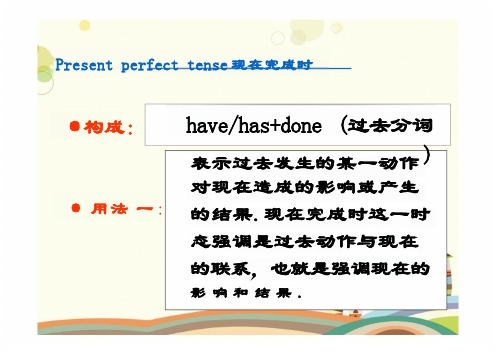
eg.1.He had his breakfast at 6:00
He has had his breakfast.
2.When did you come here? I watched the football match on TV at 9:00.
系,动作或状态发生在过去但它的影响现在还存在。例如:
· eg:I have lost my wedding ring.我丢了我的结婚戒指(这一动作虽然 发生在过去,但影响持续到现在,其结果是我现在没有结婚戒指了)
· I have sent him a Christmas card. · He has just bought a new house.
Present perfect tense 现在完成时
·构成: have/has+done (过去分词 表示过去发生的某一动作 )
对现在造成的影响或产生 · 用法 一: 的结果.现在完成时这一时
态强调是过去动作与现在 的联系,也就是强调现在的
影 响和 结果 .
· 现在完成时用来表示已发生或完成的动作或状态,其结果和现在有联
·现在完成时和一般过去式的区别: ·1 )一般过去时表示的动作或状态都已成为过去,现已不复存在。表
示纯粹的过去,与现在没有联系。而现在完成时强调过去的动作与现 在的关系。对现在产生的结果,影响等。
·I have lost my bag.(现在还没找到)
· I lost my bag.(丢了钱包,现在是否找到,不知道)
have/has gone to have/has been to
have/has been in
·have/has gone to:已经去了或在途中,还没有返回; eg:1)Where has John gone?I can't find him anywhere.(John不在说话 地方) 2)Mary has gone to Hong Kong(Mary不在说话地方,可能在香港, 可能在路上)
过去进行时(复习课件)人教版八年级下学期期末语法复习

疑问句
was/were+主语+doing
eg:—Was your mum cooking dinner at that time?
—Yes, she was./No, she wasn’t.
3
完成句子 1. His family were having lunch at 12 yesterday.(对划线部分提问)
They were having a meeting from 3 to 5 p.m. last Monday.
3
3
肯定句
was/were+doing
eg:My mum was cooking dinner at that time.
否定句
wasn’t/weren’t+doing
eg:My mum wasn’t cooking dinner at that time.
project with my team.
A.discuss
B.discussed
C.was discussing D.will discuss
5
3. On Sunday mornings, Lucy loves to listen to rock music _____ she is running. while后加进行时
过去进行时
1
目
2
3
4
录
5
6
1
1
➢ 定义: 过去进行时表示
的动作
eg: The Greens were watching a basketball match
. (昨天晚上7点:过去某一时刻)
过去进行时也可表示
的动作
初中英语八种时态归纳PPT
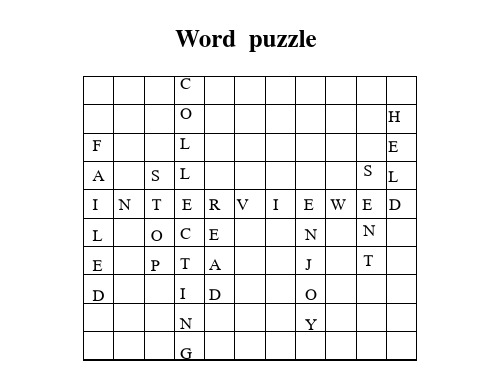
Part B 语态
Active Voice
Passive Voice
主动语态
1. Many people speak English.
At the party.
--- I _l_ik_e___ your jacket, Tim. How long _h_a_v_e_y_o_u__h_a_d__ it?
Oh…er… I __b_o_u_g_h_t__it last week. W__o_u_l_d_y_o_u__li_k_e_ to dance, Becky? ---Phew. It’s __h_o_t__ here. --- Put your jacket on the chair. You ____n_e_e_d_n’wt orry. It’ll be ok. ---That’s _b_e_tt_e_r __.
8. Mr. Green and his wife had lived (live) in London for a few years before they came (come) to work in China in 2001.
9. He said he w__o_u_ld__n_o_t_s_p_e_a(k not,speak) at the meeting the next day.
4. Hurry! Your classmates _a_r_e_w__a_it_i_n_g(wait) for you in the classroom..
1. This is the third time you _h_a_v_e__b_e_e_n__(be) here.
英语人教版八年级下册初中英语语法动词时态复习课件1.
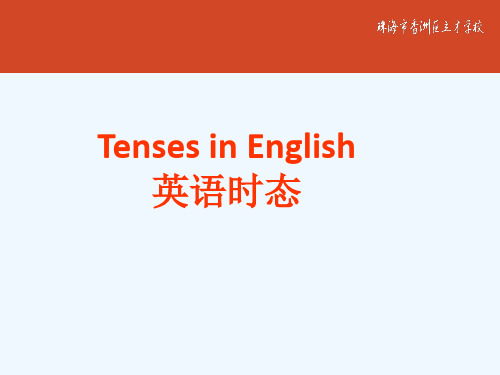
四、 一般过去时 1. 表示过去某一具体时间发生过的动作. e.g. I did my homework last night. 注意: 1)有时句中虽然没有表示确定过去时间 状语, 但根据上下文情景可以推断出是过去发生过的动 作,此时也应用一般过去时 e.g. I was sorry to learn of your illness. I didn’t know he was your father. 2)描述已故之人的动作或状态用一般过去时. e.g. Edison invented the electric light. 2. 表示过去经常反复发生的动作. He often swam when he was young. 3. 表示主语过去的状态或特征. e.g. It was rainy last week.
3. 有些表示状态或心理感觉的动词一般不用现在 进行时,而用一般现在时表示状态或感觉,如 love, like, hate, want, need, wish, know(知道), understand(懂得), remember(记得), believe, mean(意味着), think(认为), feel(认为), fit(合适), find(认为), show(表明), have(有) e.g. I know you are right. I want to visit them tomorrow. He likes English.
一般现在时与现在进行时的区别 1.进行时强调动作正在进行,而现在时强调动作的 经常和反复,或特征,这类动作没有时间性的. 2.某些表示感官知觉的动词如: see, hear, smell, taste等表示感觉,用一般时,不用进行时. e.g. Can you see a plane in the sky? 注意:1) feel 可以用一般时和进行时表示说话时 的感觉: e.g. How are you feeling today? I feel tired. 2) see, hear 有相应表示动作的动词 look at / listen to , 这些词可以用进行时 比较: Can you see a map on the wall? He is looking at a map on the wall.
时态课件:过去进行时++2023-2024学年人教版英语八年级下册
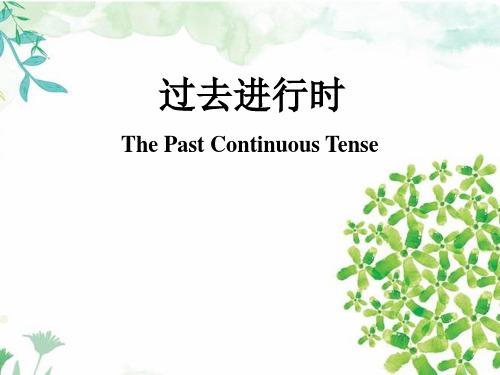
Part 3:Learning The Past Continuous Tense
1.意义:表示在过去某一时刻正在进行
的动作。
2.构成: was/were +doing
否定式: was/were not +doing
疑问式: Was/Were ……doing? 3.标志词: at this/that time yesterday at 9:00 last night ……was/were doing when….did….. while
Let’s talk
play football at four o’clock last Friday
was ing He
play football at four o’clock last Friday.
Let’s talk
ride a horse at nine last Sunday
was ing Herid
He was playing computer games.
WrWitreiteaa ccoommppoossitiitoinon
Julia和Jane是双胞胎.下面是她们上 周日的时间安排表,请你描述一下她们上 周日的生活。(字数60左右)
Time
Julia
Jane
9: 00─10: O0 do homework
The boy was playing basketball when the teacher came in.
Part 4:Exercises
一、Fill in the blanks with “when” and“ while”.
1.We were talking__w__h_e_n__ the teacher came into
最新人教版八年级下册英语期末总复习课件

• 动词时态填空: have had • 1. I __________(have) breakfast already. been lying • 2. She is ill. Shehas ___________ (lie)in bed for three weeks. has learned • 3. So far Mei __________ (learn) over 2000 English words. have been doing • 4. What _____ you _________(do) all this time? have been saying • 5. You _______________(say) that since you came here years ago.
八年级下时态总结
1. 去进行时
was / were • 助动词: _______ was / were + doing • 肯定句: ______________ wasn’t / weren’t + doing • 否定句: ______________ was / were • 一般疑问句: ___________ 放句首 例如: • 昨天8点我正在做作业. I was doing homework at 8 yesterday. __________________________ • 当他回到家时我正在听音乐. I was listening to music when he came home. __________________________
2. 主将从现
if when (当), • 如果从句是由 _____ (如果),______ __________ as soon as (一…就…) 引导的一般现在时的条 件状语从句, 主句要用一般将来时或用can, should等情态动词组成的句子。 • 如果明天下雨, 我就留在家。 If it rains tomorrow, I will stay at home. _________________________________ • 当他长大, 他将当一名医生。 __________________________________ When he grows up , he will be a doctor. • 我一打电话给他, 他就会来接我。 ___________________________________ As soon as I call him, he will pick me up.
英语人教版八年级下册初中英语语法动词时态复习课件1.p

《初中英语时态》教学设计学习目标:能初步掌握初中英语中的6种时态学习重点:理解时态中动词的不同形式应用学习难点:现在完成时态学情分析:时态在初中英语中是重点,并有一定的难度,初二学生学习起来有一定的难度,教师通过比较、习题突破。
教学步骤:一、想一想:用play的正确形式填空:1.He ___ basketball every day.2.He ___ basketball now.3.He ___ basketball tomorrow.4.He ___ basketball yesterday.5.He ___ basketball at three yesterday afternoon.6.He ___ basketball for three years.二、初中阶段8种时态:1.一般现在时2.现在进行时3.一般将来时4.一般过去时5.过去进行时6.现在完成时7.过去完成时(暂时不做要求)8.过去将来时(暂时不做要求)一、一般现在时:1.表示经常反复发生的动作.e.g. They often spend their holidays in the south.常搭配的时间状语:always often usually sometimesseldom(很少) never from time to timeevery day every …. once a week2.表示状态:e.g. He is busy at the moment.3. 表示客观真理,谚语,格言.e.g. The sun rises in the east.4. 用与时间或条件状语从句中, 代替一般将来时:e.g. I will be happy if you come.We will go when he comes.二、现在进行时1.表示说话时正在进行的动作.e.g. He is playing basketball.2. 表示目前一阶段正在进行(但说话时不一定在进行)的动作:e.g. We are preparing for an examthese days.一般现在时与现在进行时的区别1.进行时强调动作正在进行,而现在时强调动作的经常和反复,或特征,这类动作没有时间性的.2.某些表示感官知觉的动词如: see, hear, smell, taste等表示感觉,用一般时,不用进行时.e.g. Can you see a plane in the sky?注意:1) feel 可以用一般时和进行时表示说话时的感觉:e.g. How are you feeling today?I feel tired.2) see, hear 有相应表示动作的动词 look at / listen to , 这些词可以用进行时比较: Can you see a map on the wall?He is looking at a map on the wall.3. 有些表示状态或心理感觉的动词一般不用现在进行时,而用一般现在时表示状态或感觉,如love, like, hate, want, need, wish, know(知道), understand(懂得), remember(记得), believe, mean(意味着), think(认为), feel(认为), fit(合适), find(认为), show(表明), have(有)e.g. I know you are right.I want to visit them tomorrow.He likes English.当堂训练:1.Water ______(freeze结冰) at the temperature 0.2.The air _____( keep ) moving all the time.3.The town _____( lie) to the west of the hill.4.I _______( believe) you are right.5.-- ____ my son __________ (work) hard this term?-- Oh, yes, he _________(try) his best now.6. ______ the hat _______ (fit合适) me well?7._____ they ________(clean)the classroom now?三、一般将来时:相对于讲话时间将要发生的动作或情况常用的时间:tomorrow ,next week ,the day after tomorrow ,soonin the future ,in+一段时间 ...Eg. 1) She will go to the park tomorrow.2) I will return home next week.3)--- What are you going to do this evening?--- I am going to do my lessons.四、一般过去时1.表示过去某一具体时间发生过的动作.e.g. I did my homework last night.注意: 1)有时句中虽然没有表示确定过去时间的状语, 但根据上下文情景可以推断出是过去发生过的动作,此时也应用一般过去时e.g. I was sorry to learn of your illness.I didn’t know he was your father.2)描述已故之人的动作或状态用一般过去时.e.g. Edison invented the electric light.2. 表示过去经常反复发生的动作.He often swam when he was young.3. 表示主语过去的状态或特征.e.g. It was rainy last week.He was a taxi driver many years ago.练一练:1. – What happened to Mary?-- She______ (fall) off her bike and ____(hurt)herself2. Sam ____( live) in the small town for five years during the war.3. It has been 3 years since I ____(see) you last time.4. He won’t tell us where he ______(get) the book.五、过去进行时1.表示过去某一时刻正在进行的动作.e.g.He was doing shopping this time yesterday.We were having a discussion at that time.2. 表示过去某一阶段正在进行的动作.e.g. Peter was playing chess the whole afternoon yesterday.We were having a meeting from nine to eleven yesterday.3. 用与 when, while, as引导的表示过去的从句:(注意,这样的动词必须可以持续)e.g. While I was watching TV, the telephone rang.As we were leaving, some of our friends arrived.When we were playing on the playground , it began to rain.过去进行时与一般过去时的区别:过去进行时强调过去某时刻或阶段动作的进行, 不表明动作的完成, 而一般过去时表示过去某动作已发生,表明动作已完成.e.g. He was writing a composition last night.(作文不一定完成)He wrote a composition last night.(作文肯定写完了)六、现在完成时I.构成:助动词have / has + 动词的过去分词II.用法:1. 表示某一个动作对现在的影响和结果。
新人教版八年级英语下册 过去进行时-语法教学课件.ppt
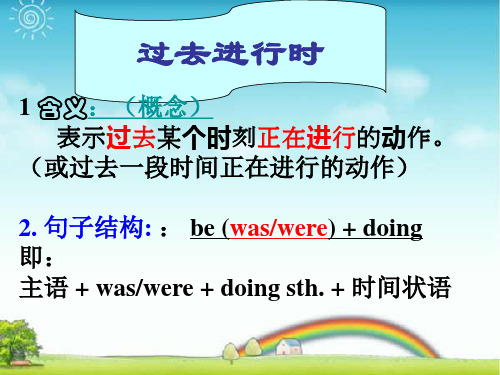
1 含义:(概念) 表示过去某个时刻正在进行的动作。
(或过去一段时间正在进行的动作)
2. 句子结构: : be (was/were) + doing 即: 主语 + was/were + doing sth. + 时间状语
过去进行时
3. 时间状语词:at 8 o’clock last night/this time yesterday /at 5:00 yesterday afternoon/at that time, then 等连用( 或者用 另一动作来表示过去的时间)
at noon yesterday?
cooking a meal. Yesterday afternoon?
playing volleyball.
having a PE class.
I was
watching TV.
We were
working in the chemistry lab. Sweeping the floor.
②:表示在过去某一时间内正在进行的动作。
She was writing a letter when I came in. 我进来时,她正在写信。
The barber was cutting my hair when they arrived. 他们到达时,理发师正在给我剪头发。
What were they doing at 10:30
(1)I was walking in the street _w__h_e_n_ the accident
happened.
(2)_w__h_e_n_ you have a meeting, you should turned
人教8下语法课:动词四大时态(一现、一过、一将、现进)和主将、情、祈从现 (35张PPT)

4
一般将来时
注: 1.当主语是第一人称I或we时,问句中一般使用shall表
示征求对方意见。如: Where shall we meet tomorrow? 明天我们在哪里会面? 2.be going to+动词原形,表示计划、打算做某事。
I am going to the park this wenkend. 3.某些动词:go,come,leave,arrive,start,begin
等可用现在进行时表将来。如: She is going there tomorrow.她明天要去那里。
即学即练
( C )1.Nancy ________ a doctor when she grows up .
A.is B.was C.is going to be
D.will
( D )2.The Greens _________ to Hainan in 5 days . A.comes B.come C.came D.will come
(3)come,go,leave,arrive,start等动词用现在进行时表示将来。 如:The bus is coming soon.车不久就会来了。
即学即练
( C )1.—Alan,.What are you doing?
—.I ________ for my mother.
A.waited
1
一般现在时
考点突破
1.一般现在时的构成
一般现在时主要用动词原形表示,如 果主语是第三人称单数,则动词也要用第 三人称单数形式。动词第三人称单数的构 成方式如下:
2.一般现在时的用法
(1)表示经常性或习惯性的动作或存在的状态,常与often, always,usually,sometimes,once a week,every day/...等表示频率的副词或时间状语连用。如: I often go to school by bike.我经常骑车去上学。
人教版英语八年级下册语法复习——现在完成时课件-课件

Key words
yet already
注意:already 用于肯定句, yet 用于疑问句和否定句中
A: __H_a_s__ your brother _fi_n_is_h_e_d his
homework yet? (finish)
B: Yes, he ‘s already done it.
Key words
have/has gone to have/has been to have/has been in
去了 说话时某人不在 只用于第三人称
去过 常与ever, never, once,twice,连用
在… 与时间段连用 用how long 提问
A: Where is Bob ? B: He __h_a_s_g_o_n_e_t_o__ Japan with his sister.
got to have/has been in
have/has been in join
have/has been a soldier
The concert has finished for half
an hour.
been over
buy have/has had
leave have/has been away
It is 3 years since Nick joined the army. 3. 他离开深圳好长时间了。
It is a long time since he left Shenzhen. 4. 这本书我已借了4个月了.
It is 4 months since I borrowed the book .
just
Just 刚刚 与现在完成时连用 一般置句中 Just now 刚才 与一般过去时连用
人教版八年级下现在完成态专题精品课件

1.过去发生的某一动作对现在造成的影响或结果;
2.也可以指过去开始的动作或状态延续到现在或者有可能
持续下去。
现在完成时的构成
have (has)+ 过去分词
助动词
考点 1 现在完成时的句式变化。 变否定句:在have/has+not, 变疑问句:把have/has提到主语前。
主语 + have/has + not + 动词过去分词.
have not=havheans’tnot=hasn’t
Have/Has + 主语 + 动词过去分词
1) We have visited the museum. (改为一般疑问句) 2) They have seen the film. (改为否定句) 3)He has returned the book. (改为否定句) 4)Jenny has had her lunch for three days. (改为一般疑问句 并做否定回答)
—No. She ________ Australia on business.
She'll come back in two days.
A.has come to
B.has gone to
C.has gone in
D.has been to
【点拨】has gone to “已经去了某地”,has been to“去过某地”。根据答句“她将在两天后回来。”可知 Mrs. Smith 是去了澳大利亚,故选B。
考点 4 have been to,have gone to和have been in
考向 have been to have gone to have been in
英语人教版八年级下册现在完成时复习课件

Jack has been ill since he came back from London( 正确 ) 三生三世已经上演两个月了 SanshengSanshi has been on for two months( 正确 )
SanshengSanshi has started for two months( 错误 )
(2)过去动作产生的影响 现在完成时所表示的动作在说话之前已完成, 但对现在有影响。句中没有具体时间状语 We have cleaned our classroom (目前教室很干净) I have lost my keys .(目前仍未找到)
(3)与表过去的不明确的时间状语连用 现在完成时可与不明确定指出具体时间的状语连用 如already, yet, just, before, recently, lately等 李小鹏已经吃完早饭了 Lixiaopeng has already had his breakfast 我近来没见到我的好朋友 I haven’t seen my best friend recently
②现在完成时表述的时间尚未结束,过去时表述 的时间已经过去。 I haven’t seen Tom this morning yet(现在仍是早晨)
I didn’t seen Tom at all this morning (现在是下午或 晚上)
③现在完成时与现在有联系,过去时仅表示过去的事 情,与现在没有联系 I have lost my key to the drawer(至今无法打开抽屉) I lost my key to the drawer(也许现在仍未找到钥匙, 也许已经找到)
(4)正确使用for和since
1.since常见有以下三种用法:for +一段时间
初中英语人教版八年级下册语法课件
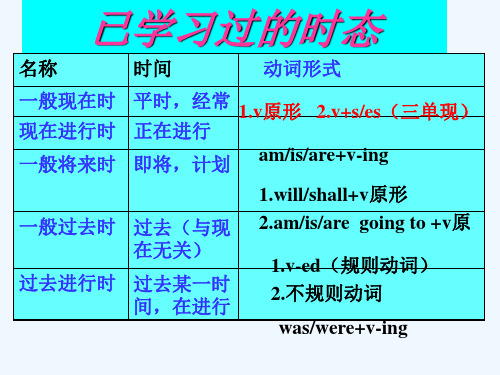
判断下列句子的时态
• 1.She works in a factory. 一般现在时 • 2.I was doing my homework at this time yesterday. 过去进行时 • 3.We are going to have a picnic this Sunday.
一般将来时
ever : 多用于疑问句. 例Has your father ever spoken to a foreigner? never :用于否定句,位于have/has后 例:We've never met such a tall man.
just : 多用于陈述句,位于have/has后 例:Lucy has just washed her clothes. before :可用于各句式,位于句尾。 例:I have read this book before. He hasn't been abroad before. Have you flown to Hainan before?
• 4.They held a sports meeting last week.
一般过去时
• 5.Are you helping your mother ?
现在进行时
Present Perfect Tense
现在完成时态的用法
表示已完成的某一动作对现在造成的 影响或结果
一、结构: 二、句式: 三、用法及标志词: 四、注意事项:
标志词:
三、现在完成时态的用法:
already :多用于陈述句,位于have/has后,有时 位于句尾。 例:I have already finished my homework. yet : 用于疑问句和否定句,位于句尾。 例:Have you found your lost book yet ? I haven't had breakfast yet.
英语人教版八年级下册动词时态
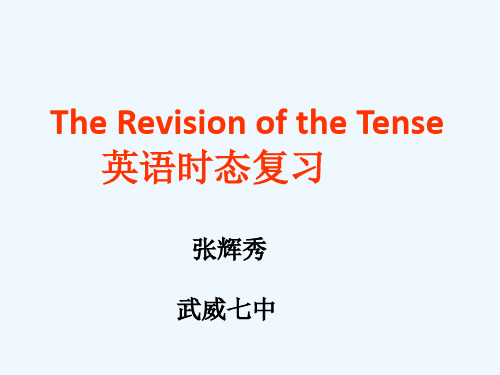
It’s 10 in the morning
at present=now=at the moment at ten yesterday morning this time yesterday
at that time
It was 10 in the morning
看时间,定时态
always ,often, usually, sometimes , hardly every day once a week in 2011 last year after three days every other day the day before yesterday
three months ago
The Revision of the Tense 英语时态复习
张辉秀 武威七中
一.关于时态:
1.何谓时态:
行为、动作和状态在各种时间条件下的 动词形式。
一般现在时态 do/does
现在时态
现在进行时态 am\is\are doing 现在完成时态 have\has done 一般过去时态 did
by the time we got outside
用所给动词的正确时态填空
watches 1. He ____________ (watch) TV every evening. 2. Be quiet! The baby ____________ is sleeping (sleep). 3. We ________(go) to the cinema if it ______ will go is (be) fine tomorrow. 4. Look at the clouds. I think it ______________ is going to rain(rain).
人教版初中英语语法知识学习课件PPT之动词的时态语法学习PPT

One morning when Liu Tao woke up, he jumped out of his bed happily. He 1. _______ a great idea. He would build a tree house! Liu Tao asked his dad, "Is it OK if I 2.________ a tree house in the old tree outside the house?"
has
8.—Lily, what______ you usually do after school?—I do exercise with my friends.
do
9.Michael _______ teach in a school in a village next year.
will
10.The headmaster is not available now. He _____ speaking to the new teachers.
动词的时态语法学习
图解语法
考点 1 动词时态的类型
初中阶段常考的动词时态有:
分类
含义
构成
一般现在时
表示经常性、习惯性的动作
主语+动词原形/动词的第三人称单数形式
一般过去时
表示过去发生的动作或存在的状态
主语+动词的过去式
一般将来时
表示将要发生的动作或将来的状态
主语+will/shall+动词原形或主语+am/is/are going to+动词原形
英语人教版八年级下册初中英语时态教学课件

中考考点·精讲
动 词
一般现过将在去来时时时:::谓谓谓语语语动用用词动wi用词ll/s原的ha形过ll/或去be第式go三ing人t称o+单动数词原形
的
时 态
现在进完行成时时::谓谓语语用用ahmav/eis//haarse++动动词词的的过现去在分分词词
句中可以和一段时间连用。
The rich woman is always laughing at the poor. 这个有钱的 女人总是嘲笑穷人。
谢谢观看!
种类
现在 完成 时
谓形式
用法
1.表示过去发生的动作对现在造成的影响 和结果。 2.表示动作从过去开始一直持续到现 have/has+ 在,并有可能继续下去,常与“for+时 动词的过 间段”或“since+表示过去的时间点或 去分词 时间段”连用。 注意:终止性动词在现在完成时中不能 和表示一段时间的状语连用,但在否定
过去进行时:谓语用were/was+动词的现在分词
动词的语态被 主动 动语 语态 态
动词的时态
种类
be动词的一 般现在时
行为动词及 其他连系动 词的一般现
在时
谓语形式
is, am, are+ 表语,根据 人称而定
1.动词原形 2.主语是 单数第三人 称,谓语
加s,es
用法
表示现在的状态
1.表示过去发生的动作。 2.表示过去经常发生的动作。 3.用于虚拟语气中,表示与现在 事实相反的情况。
1.表示说话时或目前正在进行的动 作。 2.与always,usually等词连用, 表示赞扬、厌恶或不满的情绪。
种类 过去进行
时
一般将来 时
谓语形式 was/were+动 词的现在分词
- 1、下载文档前请自行甄别文档内容的完整性,平台不提供额外的编辑、内容补充、找答案等附加服务。
- 2、"仅部分预览"的文档,不可在线预览部分如存在完整性等问题,可反馈申请退款(可完整预览的文档不适用该条件!)。
- 3、如文档侵犯您的权益,请联系客服反馈,我们会尽快为您处理(人工客服工作时间:9:00-18:30)。
当堂训练:
1. Water freezes ______(freeze结冰) at the temperature 0. keeps keep ) moving all the time. 2. The air _____( 3. The town _____( lies lie) to the west of the hill. believe believe) you are right. 4. I _______( Is my son __________ working (work) hard this term? 5. -- ____ is trying -- Oh, yes, he _________(try) his best now. Does the hat _______ fit 6. ______ (fit合适) me well? Are they cleaning 7._____ ________(clean)the classroom now?
四、 一般过去时 1. 表示过去某一具体时间发生过的动作. e.g. I did my homework last night. 注意: 1)有时句中虽然没有表示确定过去时间 状语, 但根据上下文情景可以推断出是过去发生过的动 作,此时也应用一般过去时 e.g. I was sorry to learn of your illness. I didn’t know he was your father. 2)描述已故之人的动作或状态用一般过去时. e.g. Edison invented the electric light. 2. 表示过去经常反复发生的动作. He often swam when he was young. 3. 表示主语过去的状态或特征. e.g. It was rainy last week.
III. 现在完成时与一般过去时的区别: 1) 完成时强调过去发生的动作的结果和影响;而 一般过去时强调动作发生的时间,地点,方式等, 与现在没有联系。 e.g. I have just had breakfast. I had breakfast five minutes ago. (时间) I have finished my homework. I finished my home at home. (地点) 2)现在完成时表示的持续状态强调持续到说话 时为止, 与现在有联系, 而一般过去时表示的持 续状态强调过去某段时间的经历, 与现在没有联 系。
初中阶段8种时态: 1.一般现在时 2.现在进行时 3.一般将来时 4.一般过去时 5.过去进行时 6.现在完成时 7.过去完成时(暂时不做要求) 8.过去将来时(暂时不做要求)
一、一般现在时: 1.表示经常反复发生的动作. e.g. They often spend their holidays in the south. 常搭配的时间状语: always often usually sometimes seldom(很少) never from time to time every day every …. once a week 2.表示状态: e.g. He is busy at the moment. 3. 表示客观真理,谚语,格言. e.g. The sun rises in the east.
4. 用与时间或条件状语从句中, 代替一般将来时: e.g. I will be happy if you come. We will go when he comes.
二、现在进行时 1.表示说话时正在进行的动作. e.g. He is playing basketball. 2. 表示目前一阶段正在进行(但说话时不一定在进 行)的动作: e.g. We are preparing for an exam these days.
As we were leaving, some of our friends arrived. When we were playing on the playground , it began to rain. 过去进行时与一般过去时的区别: 过去进行时强调过去某时刻或阶段动作的进行, 不表明动作的完成, 而一般过去时表示过去某动 作已发生,表明动作已完成. e.g. He was writing a composition last night.(作文不一定完成) He wrote a composition last night.(作文肯定 写完了)
分析比较
e.g. The Greens have stayed in China for a year. The Greens stayed in China for a year during the war.
I have learned computer for some time. I learned computer for some time while I was in Beijing.
六、 现在完成时 I. 构成: 助动词have / has + 动词的过去分词 II. 用法: 1. 表示某一个动作对现在的影响和结果。 e.g. I have already finished my homework. They have bought a new house. 常用的时间状语:already, just, yet 2. 表示从过去某一时间开始,一直持续到说话时, 而且动作还在延续, 常与 “ for+ 时间段 ” 或 “ since + 时间点 ” 的时间状语连用。 e.g. We have learned English for five years/since 2012. He has taught here since he came here.
小结1:常见时间搭配时态
1.一般现在时:always,often,usually,every day,on weekends 2.现在进行时:look,listen,now 3.一般将来时:tomorrow,next week,in the future,in three days 4.一般过去时:yesterday,last week,in 2000 5.过去进行时:at ten yesterday morning 6.现在完成时:already,yet,for 3 years,since 2000
一般现在时与现在进行时的区别 1.进行时强调动作正在进行,而现在时强调动作的 经常和反复,或特征,这类动作没有时间性的. 2.某些表示感官知觉的动词如: see, hear, smell, taste等表示感觉,用一般时,不用进行时. e.g. Can you see a plane in the sky? 注意:1) feel 可以用一般时和进行时表示说话时 的感觉: e.g. How are you feeling today? I feel tired. 2) see, hear 有相应表示动作的动词 look at / listen to , 这些词可以用进行时 比较: Can you see a map on the wall? He is looking at a map on the wall.
三、一般将来时: 相对于讲话时间将要发生的动作或情况 常用的时间:tomorrow ,next week , the day after tomorrow ,soon in the future ,in+一段时间 ... Eg. 1) She will go to the park tomorrow. 2) I will return home next week. 3)--- What are you going to do this evening? --- I am going to do my lessons.
I saw this film yesterday.
(只说明动作发生在过去。)
I have seen this film.
(强调对现在的影响,电影的内容已经知道了。)
She has returned from Paris.
(她已从巴黎回来了。)
She returned yesterday.
(她是昨天回来的。)
五、 过去进行时 1. 表示过去某一时刻正在进行的动作. e.g. He was doing shopping this time yesterday. We were having a discussion at that time. 2. 表示过去某一阶段正在进行的动作. e.g. Peter was playing chess the whole afternoon yesterday. We were having a meeting from nine to eleven yesterday. 3. 用与 when, while, as引导的表示过去的从句: (注意,这样的动词必须可以持续) e.g. While I was watching TV, the telephone rang.
Hale Waihona Puke He has been in the League for three years.
(在团内的状态可延续)
He joined the League three years ago.
( 三年前入团,joined为短暂行为。)
想一想:现在你会做了吗?
用play的正确形式填空: plays basketball every day. 1.He ______ is playing basketball now. 2.He ________ 3.He will ________ basketball tomorrow. play 4.He played ______ basketball yesterday. was playing basketball at three 5.He __________ yesterday afternoon. 6.He _________ has played basketball for three years.
